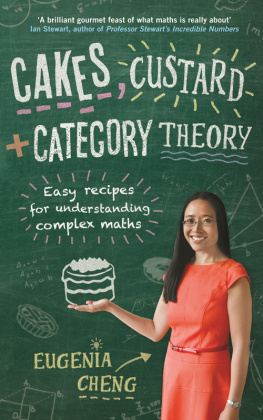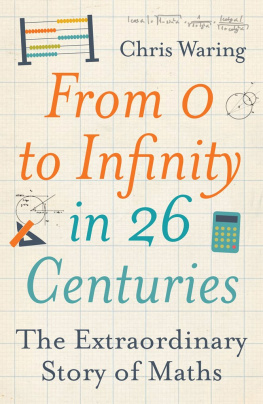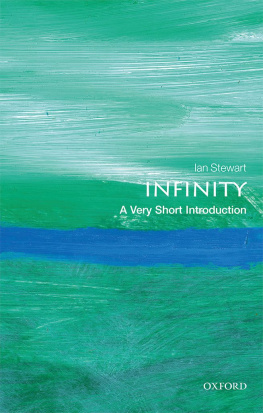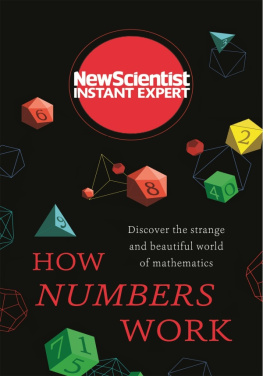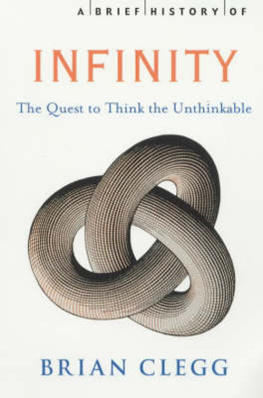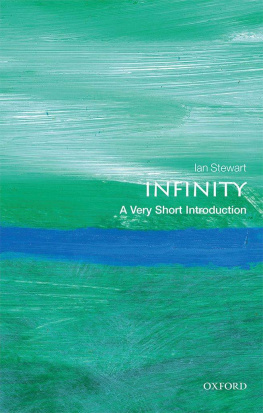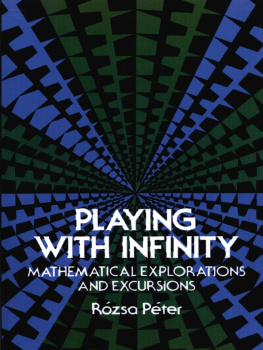Eugenia Cheng - Beyond Infinity: An Expedition to the Outer Limits of the Mathematical Universe
Here you can read online Eugenia Cheng - Beyond Infinity: An Expedition to the Outer Limits of the Mathematical Universe full text of the book (entire story) in english for free. Download pdf and epub, get meaning, cover and reviews about this ebook. year: 2017, publisher: Profile Books, genre: Children. Description of the work, (preface) as well as reviews are available. Best literature library LitArk.com created for fans of good reading and offers a wide selection of genres:
Romance novel
Science fiction
Adventure
Detective
Science
History
Home and family
Prose
Art
Politics
Computer
Non-fiction
Religion
Business
Children
Humor
Choose a favorite category and find really read worthwhile books. Enjoy immersion in the world of imagination, feel the emotions of the characters or learn something new for yourself, make an fascinating discovery.
- Book:Beyond Infinity: An Expedition to the Outer Limits of the Mathematical Universe
- Author:
- Publisher:Profile Books
- Genre:
- Year:2017
- Rating:4 / 5
- Favourites:Add to favourites
- Your mark:
Beyond Infinity: An Expedition to the Outer Limits of the Mathematical Universe: summary, description and annotation
We offer to read an annotation, description, summary or preface (depends on what the author of the book "Beyond Infinity: An Expedition to the Outer Limits of the Mathematical Universe" wrote himself). If you haven't found the necessary information about the book — write in the comments, we will try to find it.
Even small children know there are infinitely many whole numbers - start counting and youll never reach the end. But there are also infinitely many decimal numbers between zero and one. Are these two types of infinity the same? Are they larger or smaller than each other? Can we even talk about larger and smaller when we talk about infinity? In Beyond Infinity, international maths sensation Eugenia Cheng reveals the inner workings of infinity.
What happens when a new guest arrives at your infinite hotel - but you already have an infinite number of guests? How does infinity give Zenos tortoise the edge in a paradoxical foot-race with Achilles? And can we really make an infinite number of cookies from a finite amount of cookie dough?
Wielding an armoury of inventive, intuitive metaphor, Cheng draws beginners and enthusiasts alike into the heart of this mysterious, powerful concept to reveal fundamental truths about mathematics, all the way from the infinitely large down to the infinitely small.
**
ReviewBeyond Infinity is witty, charming, and crystal clear. Eugenia Chengs enthusiasm and carefully chosen metaphors and analogies carry us effortlessly through the mathematical landscape of the infinite. A brilliant book! -- Ian Stewart, author of Calculating the Cosmos Praise for How to Bake Pi: It would be wonderful if this book attracted a new audience to the field. And theres no better ambassador (or dinner-party host, Id wager) than Eugenia Cheng. -- Alex Bellos New York Times A concert pianist, mathematician, polyglot and now YouTube star, Cheng has carved out quite a niche for herself demystifying maths through cake. Its a Beautiful-Mind-meets-Scott-Pilgrim kind of mission, and Cheng brings to it an ebullient enthusiasm thats infectious Guardian
About the AuthorEugenia Cheng is Honorary Fellow in Pure Mathematics at the University of Sheffield and Scientist in Residence at the School of the Art Institute of Chicago. She was educated at the University of Cambridge and did post-doctoral work at the Universities of Cambridge, Chicago and Nice. Since 2007 her YouTube lectures and videos have been viewed over a million times. A concert pianist, she also speaks French, English and Cantonese, and her mission in life is to rid the world of maths phobia. She is the author of How to Bake Pi.
Eugenia Cheng: author's other books
Who wrote Beyond Infinity: An Expedition to the Outer Limits of the Mathematical Universe? Find out the surname, the name of the author of the book and a list of all author's works by series.


